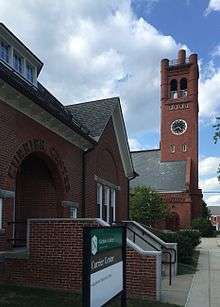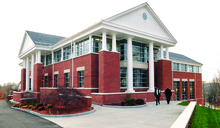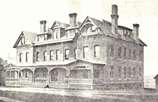Nichols College
| Motto | Learn. Lead. Succeed. |
|---|---|
| Type | Private |
| Established | 1815 |
| Endowment | $6.0 million[1] |
| President | Dr. Susan West Engelkemeyer |
| Students | 1,453[2] |
| Location |
Dudley, Massachusetts, |
| Campus |
Suburban 200 acres (0.81 km2)[2] |
| Athletics | NCAA Division III |
| Colors | Black & Green |
| Nickname | Bison |
| Affiliations | NAICU, NEASC, AICUM, TCCC, NEFC, ECAC |
| Website | Nichols College |

Nichols College is a private, four-year, not-for-profit, coeducational college located in Dudley, Massachusetts. Founded in 1815 as Nichols Academy, Nichols College offers twelve specializations in its business program, five majors in its liberal arts program, and an Educator Preparation Program for middle and secondary education. The College offers bachelor's and master's degrees as well as certificate programs.[3]
Rankings
In a 2016 report, Payscale.com ranked Nichols College 13th nationally for business schools for Return on Investment (ROI) [4] and 7th in 2014.
In its 2016 report, U.S. News & World Report rated Nichols College as the #36th school in the Northern region.[5] and 40th in 2014.
Academics
Nichols College offers three undergraduate degrees—the Associate in Business Administration, the Bachelor of Science in Business Administration, and the Bachelor of Arts. It also offers an MBA,[6] an MSA[7] and MSOL[6] The College also offers several certificate and corporate programs.[8]
Schools and Programs
- Bachelor of Science in Business Administration
- Accounting
- Business Communication
- Criminal Justice Management
- Economics
- Finance
- General Business
- Hospitality Management
- Human Resource Management
- International Business
- Management
- Marketing
- Sport Management
- Bachelor of Arts
- Economics
- English
- History
- Mathematics
- Psychology
- Educator Preparation Program (Middle and Secondary Education)
- Business
- English
- History
- Mathematics
- Accelerated Programs
- Master of Science in Business Administration (MBA) (2 degrees, 5 years)
- Master of Science in Accounting (MSA) (2 degrees, 4 years)
- Honor Scholars Program
- Certificate in Entrepreneurship
- Graduate and Professional Studies
- Master of Business Administration
- Master of Science in Organizational Leadership (MSOL)
- Master of Science in Accounting (MSA)
- Dual Degrees: MBA/MSOL; MSA/MSOL; MSA/MBA
- Certificate in Advanced Critical Thinking and Decision Making
- Certificate in Leadership
- Certificate in Employee Benefits
- Certificate in Operations Management/Six Sigma
Professional Development Seminar
Nichols' signature Professional Development Seminar (PDS) Program is a four-year program of one credit academic courses. Coursework logically builds on the prior year, with first-year students receiving help with the transition to college and exploring majors; second-year students exploring majors and internship opportunities, writing resumes and developing portfolios; third-year students refining their job search skills including interviewing, writing resumes and developing portfolios; and fourth-year students launching successful careers.
Global Learning
Study Abroad options; faculty-led course related travel; The Washington Center in Washington, DC; and Nichols international student population on campus
Campus
Nichols College is divided into North and South Campus. The North and South Campuses are divided by the Fels Student Center.
Fels Student Center
Fels Student Center opened in 2012. Located at the center of the campus, the 30,000-square-foot Center houses student services, including the Center for Student Involvement, Residence Life and Career Services; a meeting space for student government and clubs; an alternative food service; and a student lounge, post office, bookstore and Nichols College radio station WNRC 97.5 FM. The Center features a classroom with a 35-foot LED scrolling stock ticker and web and video conferencing capability, giving students access to guest lecturers from around the world via audio or video.

North Campus
The north campus consists of ten out of the twenty-two campus buildings. The southernmost part of this campus is Conrad Hall. The westernmost part of north campus is Conant Library. The Nichols north campus consists mostly of academic halls. Also located in the north campus are three of the oldest buildings at the Dudley campus, 1881-1885, Conant Library and Observatory, Academy Hall, and Conant Hall. The north campus is also home to the newest building on campus, which is an academic building that has distinctive design elements including a three-story lobby with a water feature, several breakout areas for studying, gathering, or group work, and a patio/garden that will bridge the academic building with Davis Hall and serve as the primary entrance for students.
South Campus
The south campus consists of twelve out of the twenty-two campus buildings. The northernmost part of the campus is the Currier Center. The southernmost part of the campus is Kuppenheimer Residence Hall. The easternmost part of the south campus is the athletic complex.
The athletic complex is the focal point of the south campus. The complex includes Vendetti Field, a multipurpose turf field used for football and men’s and women’s lacrosse. The athletic complex also includes facilities for baseball, softball, tennis and soccer. In addition to the athletic field, the Athletic Center is used for indoor events and the Chalmers Field House for athletic training.
History
Founding

The institution was originally founded in 1815 as Nichols Academy. The Academy’s founder was Amasa Nichols, a wealthy industrialist in Dudley, Massachusetts. Early benefactors of the Academy include textile manufacturers Samuel Slater and Hezekiah Conant. Nichols Academy closed its doors in 1909. Between 1909 and 1931, the Academy buildings were used by the town and leased to other educational entities over different periods of time.[9]
Conrad's legacy
In 1931, James L. Conrad reorganized the school to Nichols Junior College of Business Administration and Executive Training, a two-year college, at the closed Nichols Academy location. Nichols Junior College’s purpose was to incorporate a new idea in education—a junior college for men only, and an institution where a student can secure a college education in business administration and executive training and at the same time enjoy the advantages of campus life. Its program of study was to combine courses in business education, similar to those offered in the third and fourth years of four-year colleges and universities, with necessary electives and selected cultural subjects. All of this occurred in a two-year format. In 1938, the Massachusetts State Department of Education authorized Nichols Junior College to award the Associate in Business Administration degree. Over time, the College purchased, constructed, and remodeled over forty-four buildings to shape most of the current campus that is seen today. [Source: book by James L. Conrad—Nichols: A College for the Hill, 1931-1996]
In 1958, Nichols became Nichols College of Business Administration, a four-year college with the authority to grant a Bachelor of Business Administration degree. In 1965, Nichols College became accredited by the New England Association of Schools & Colleges. The College became a member of the NCAA in 1966. In 1971, Nichols became co-educational, and the Massachusetts Board of Higher Education authorized the College to award the degrees of Bachelor of Arts, Bachelor of Science in Business Administration, and Bachelor of Science in Public Administration. In 1974, the College received the authority to grant the degree of Master of Business Administration. The College was granted accreditation by the International Assembly for Collegiate Business Education (IACBE) in 2005. In 2007, Nichols was granted authority to offer the degree of Master of Science in Organizational Leadership.
In 1980, Nichols established the Institute for American Values, later renamed the Robert C. Fischer Policy & Cultural Institute in 1999, as a department of the College providing a forum for the free exchange of ideas.[9]
In 2013, The Center for Women’s Leadership[10] was established with the goal of developing the leadership potential of female students, and serving as a resource and authoritative voice on women’s leadership for the community at large.
In 2014, the new Emerging Leaders program began with the introduction of the new LEAD101 class, and Nichols began a series of events to celebrate its bicentennial.
History of presidents
In 2011, Dr. Susan West Engelkemeyer became the second woman to hold the position of President of Nichols College and its seventh president. The president is the chief executive officer of the college and is responsible for the fulfillment of the college's mission.
| President | Tenure |
|---|---|
| Amasa Nichols | 1815– |
| Col. James L. Conrad | 1931–1966 |
| Dr. Gordon B. Cross | 1966–1973 |
| Dr. Darcy Coyle | 1973–1978 |
| Dr. Lowell C. Smith | 1978–1996 |
| Dr. James J. Darazsdi | 1996–1998 |
| Dr. Debra M. Townsley | 1998–2010 |
| Gerald Fels (interim) | 2010–2011 |
| Dr. Susan W. Engelkemeyer | 2011–present |
Athletics
The Athletic Department at Nichols College has a history of championship teams and has had a strong presence in New England Division III athletics.[11] In 2012, the women's tennis team achieved its third undefeated conference record for the regular season. In the 2012-13, men's tennis claimed its second consecutive Commonwealth Coast Conference (CCC) title. In 2014, men’s ice hockey won the Eastern College Athletic Conference (ECAC) Northeast Championship.[12]
Teams
Nichols College athletics teams are known as the Bison. Currently, the Nichols College Department of Athletics offers ten men's intercollegiate sports: baseball, basketball, cross country, football, golf, ice hockey, lacrosse, soccer, tennis, and track and field. They also offer nine women's intercollegiate sports: basketball, cross country, field hockey, ice hockey, lacrosse, soccer, softball, tennis, and track and field. The school varsity teams compete at the National Collegiate Athletic Association Division III level. Nichols is a member of the Commonwealth Coast Conference for most sports. The football team is a member of the New England Football Conference while the men's ice hockey team compete in the ECAC Northeast and women's hockey in the ECAC East. The school also sponsors a variety of club sports.
References
- ↑ Nichols College "Nichols at a glance".
- 1 2 College Board School Profile
- ↑ Undergraduate Degree Programs, nichols.edu.
- ↑ 2016 College ROI Report: Best Value Business Schools, payscale.com. Retrieved 2016-08-29.
- ↑ Nichols College, colleges.usnews.rankingsandreviews.com. Retrieved 2016-08-29.
- 1 2 Master of Business Administration, nichols.edu. Retrieved 2016-08-29.
- ↑ Master of Science in Accounting, nichols.edu. Retrieved 2016-08-29.
- ↑ Graduate programs, nichols.edu. Retrieved 2016-08-29.
- 1 2 History & Accreditation, nichols.edu. Retrieved 2016-08-29.
- ↑ About IWL, iwl.nichols.edu. Retrieved 2016-08-29.
- ↑ Division III athletic history and reclassification system
- ↑ "Jackson's OT goal gives Bison 3-2 over Wentworth & ECAC Northeast Championship", Nichols College Bison Athletics, March 8, 2014. Retrieved 2016-08-29.
External links
- Official Nichols College Website
- Graduate and Professional Studies at Nichols College Website
- Official Nichols College Athletics Website
- Nichols College Alumni Relations Website
- Discussion of founding of Nichols Academy
Coordinates: 42°03′N 71°56′W / 42.050°N 71.933°W